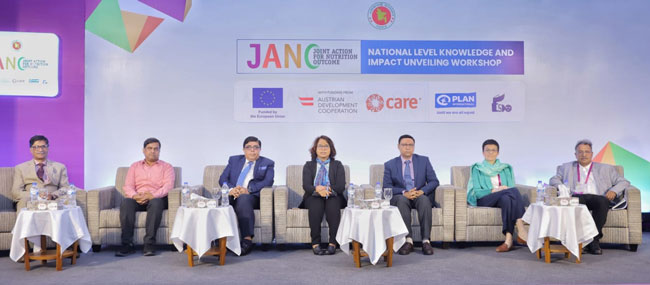Joint Action for Nutrition Outcome (JANO) Project Concludes
Industry Desk: On March 10th, 2024, The Joint Action for Nutrition Outcome (JANO) Project, funded by the European Union (EU) and managed through a consortium led by Plan International Bangladesh, CARE Bangladesh, culminated its endeavors with a National Sharing Event, entitled “National Level Knowledge and Impact Unveiling Workshop” at the Radisson Blu Water Garden in the capital city. Collaboratively organized with the Directorate of Secondary and Higher Education (DSHE) and Plan International Bangladesh, the event marked a pivotal moment in reflecting on the project’s contributions to advancing nutrition outcomes in Bangladesh.
The event was Graced by the esteemed presence Prof. AQM Shafiul Azam, Director-Planning and Development Wing, Directorate of Secondary and Higher Education Dr Md Mahbubur Rahman, DG (acting), Bangladesh National Nutrition Council Office, Prof Md Moshiuzzaman, Member, National Curriculum and Textbook Board (NCTB), Margherita Capalbi, Programme Manager, European Union; Dr Md Shahid Uz Zaman, Executive Director, ESDO; and Shamim Jahan, Deputy Country Director, CARE Bangladesh.
Graced by the esteemed presence of Md Khairul Alam Sheikh, Secretary, Ministry of Social Welfare, the event welcomed stakeholders, government representatives, and project partners to discuss the impact and achievements of the JANO Project. As the chief guest, Md Khairul Alam Sheikh commended the concerted efforts and emphasized the importance of sustained initiatives in improving the SRHR knowledge and well-being of vulnerable populations.
Kabita Bose, country director of Plan International Bangladesh, chaired the event. In her speech, she said that Plan International Bangladesh has evaluated the issue of ensuring nutrition of adolescent girls through gender lenses in JANO project. Mentioning the disparities that a girl child faces in education and health sector from birth, she said we have to take a long-term action plan to bring them to the mainstream of development by preventing gender discrimination from the beginning. She sought collaborative cooperation of the Directorate of Secondary and Higher Education, Bangladesh Nutrition Council, National Curriculum and Textbook Board in this regard.
Professor Dr. AQM Shafiul Azam said that the education system should be taken forward by using knowledge, skills and experience in a creative way. In JANO projects DSHE, DGFP, DGHS, NCTB and NGOs had worked together in such a coordinated way which give us a positive outcome.
Ashik Billah, Head of the Central and Northern Region of Plan International Bangladesh, provided a comprehensive overview of the project’s accomplishments, challenges, and future outlook.
Nishath Sultana, Director- Policy, Advocacy, Influencing, and Campaign of Plan International Bangladesh, warmly welcomed participants, setting the stage for productive deliberations and knowledge sharing.
A panel discussion on GEMS (Gender Equity Movement in School) intervention was held at the school level. There students have been asked to get out of stereotype concept. In this direction, efforts have been made to include the topics of GEMS Session in the newly initiated curriculum.
Operating across seven Upazilas in Rangpur and Nilphamari districts, the JANO project has been instrumental in improving the health and nutrition outcomes of children under five years of age, pregnant and lactating mothers, and adolescents. Its collaborative approach has facilitated partnerships with 22 government departments and ministries, including the Ministry of Health and Family Welfare and the Bangladesh National Nutrition Council, supporting the implementation of the Second National Nutrition Action Plan.
President Joe Biden tests positive for COVID-19 while campaigning in Las Vegas, has ‘mild symptoms’
International Desk: President Joe Biden tested positive for COVID-19 while traveling Wedne…








